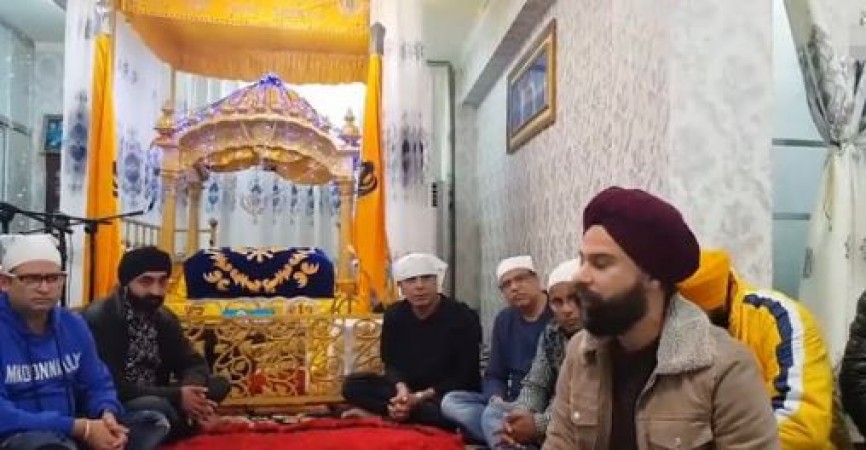
In the bustling city of Yiwu, located in the heart of Zhejiang province, China, an unexpected sanctuary of peace and spirituality awaits visitors from all walks of life. The Gurudwara Sahib Yiwu stands tall amidst the modern cityscape, a testament to the rich cultural diversity and religious harmony that characterizes this enchanting city.
The story of Gurudwara Sahib Yiwu traces its roots back to the early 20th century when Sikh traders from Punjab first arrived in the city in search of business opportunities. Captivated by Yiwu's vibrant commercial spirit, they established a small community that grew over the years. As the Sikh community expanded, they felt the need for a place where they could connect with their faith and foster a sense of unity and brotherhood.
Also Read: Gurudwara Rakab Ganj Sahib: Symbol of Faith
The Gurudwara Sahib Yiwu was born out of this necessity. Although relatively modest in size compared to some of its counterparts around the world, its significance lies in the spirit of devotion and unity it fosters among the Sikh community and beyond.
The architectural style of the Gurudwara is an exquisite blend of Punjabi and Chinese influences, reflecting the harmonious coexistence of these two cultures. The entrance is adorned with intricately carved wooden panels, representing scenes from Sikh history and the teachings of Guru Nanak. The dome, painted in a pristine white, proudly stands tall, symbolizing the belief in one God.
Stepping inside, visitors are welcomed by the soothing sounds of Kirtan (devotional songs) that echo through the prayer hall. The interiors boast colorful murals depicting scenes from Sikh scriptures, harmonizing with the vibrant hues of the stained glass windows, which allow sunlight to filter in and illuminate the sacred space.
Also Read: Gurudwar Sri Panja Sahib: Hand Prints of Guru Nanak Dev Ji
Every morning, the Gurudwara resonates with the melodious recitation of Asa Ki Vaar, a collection of hymns by Guru Nanak Dev Ji, setting a spiritually uplifting tone for the day. Devotees, donning traditional Sikh attire, participate in the recitation and immerse themselves in the profound teachings of the Gurus.
The Langar, a community kitchen, is an integral part of the Gurudwara. Irrespective of one's religion, caste, or social status, everyone is welcome to partake in the simple yet heartwarming vegetarian meal prepared with love and devotion by volunteers. The egalitarian tradition of Langar embodies the core Sikh values of selfless service, equality, and compassion for all.
Apart from serving as a place of worship and community gathering, Gurudwara Sahib Yiwu also plays a significant role in fostering cultural exchange between the Sikh community and the local Chinese populace. Regular workshops on Punjabi culture, language, and history are conducted, creating a bridge between these two diverse yet interconnected cultures.
The Gurudwara also organizes charity events, supporting various social initiatives within the local community. Medical camps, educational programs, and environmental awareness drives are just a few examples of the initiatives undertaken by the Sikh community in Yiwu.
Also Read: Gurudwara Sri Goindwal Sahib: Establishment Of The Manji System
During major Sikh festivals like Guru Nanak Gurpurab and Baisakhi, the Gurudwara comes alive with festivity and devotion. The sounds of dhol and Gurbani fill the air, and the atmosphere is charged with an electric energy that is both joyous and spiritually uplifting. Devotees from neighboring cities and countries also flock to Yiwu to participate in the celebrations, making it a truly international affair.
The Gurudwara Sahib Yiwu stands as a beacon of hope and harmony, a living testament to the idea that spirituality transcends borders and unites humanity. It is a place where travelers find solace amidst their journeys, where locals discover the universality of faith, and where hearts open up to embrace the divine light that shines within us all.
Also Read: Gurudwara Sri Tarn Taran: A Saving Boat
Gurudwara Sahib Yiwu is not just a place of worship; it is a symbol of cultural fusion, religious tolerance, and humanitarian values. As it continues to welcome pilgrims and visitors alike, it serves as a constant reminder that in this vast world, people from diverse backgrounds can come together as one in the embrace of spirituality and compassion.
Also Read: Gurudwara Sri Kartarpur Sahib: Birth Place Of Guru Nanak Dev Ji